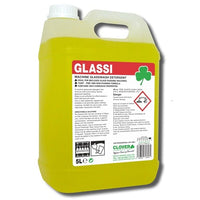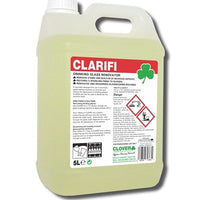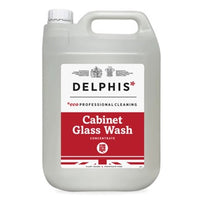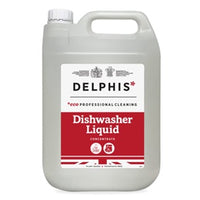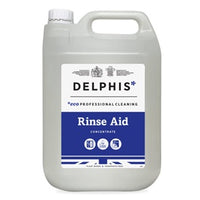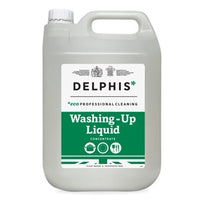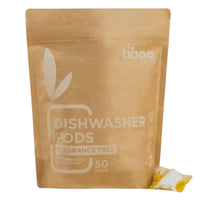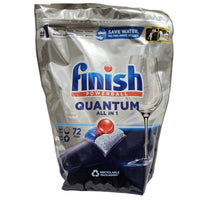Collection: Dishwasher and Glass Washing Products
Our dishwashing products are suitable for domestic and professional use, from top brands, including Clover Chemicals, to much-loved household name Fairy.
Dish and Glass Washing Product information
Dish and glass washing represents a critical component of kitchen hygiene and food safety, requiring specialised products that effectively remove food
residues, grease, and contaminants whilst maintaining hygiene standards and delivering spotless results across domestic and commercial applications.
At ClickCleaning, we provide comprehensive dishwashing solutions suitable for both domestic and professional environments, featuring trusted brands including Clover Chemicals for commercial applications and household favourites like Fairy for domestic use. Our extensive range encompasses commercial dishwash chemicals, domestic dishwasher products, washing up liquids, and specialised glass washer chemicals designed to meet diverse cleaning requirements.
The complexity of effective dishwashing requires understanding soil types, water conditions, temperature requirements, and application methods that ensure thorough cleaning whilst maintaining equipment efficiency and hygiene compliance. Different washing challenges demand specific formulations to
achieve optimal results across varied operational conditions.
Commercial dishwash chemicals provide enhanced performance for high-volume operations including restaurants, hotels, catering facilities, and institutional kitchens where efficiency, hygiene, and cost-effectiveness are paramount. These professional formulations deliver superior grease cutting, protein removal, and sanitisation whilst maintaining compatibility with commercial dishwashing equipment.
Domestic dishwasher products address the specific requirements of household automatic dishwashers through formulations designed for varied water hardness, temperature cycles, and loading patterns typical of domestic use. These products ensure effective cleaning whilst protecting dishware and maintaining machine performance throughout extended use cycles.
Washing up liquids combine convenience with effectiveness for manual dishwashing applications across both domestic and light commercial environments. These versatile formulations provide excellent grease cutting capabilities whilst maintaining gentle characteristics suitable for frequent
hand contact and diverse dishware materials.
Glass washer chemicals deliver specialised performance for commercial glass washing equipment including pubs, restaurants, and hospitality venues where spotless glassware presentation is critical for customer satisfaction and operational reputation. These formulations address water hardness, eliminate spots and streaks, and maintain glass clarity essential for professional presentation.
Water hardness considerations significantly impact dishwashing performance, with different formulations optimised for soft, medium, and hard water conditions commonly found across UK regions. Understanding local water characteristics enables optimal product selection and dosing for consistent results whilst preventing scale buildup and equipment damage.
Temperature compatibility ensures products work effectively across diverse washing temperatures from energy-efficient cool cycles to high-temperature
sanitising washes essential for commercial food service applications. Modern formulations provide flexibility whilst maintaining cleaning performance across operational requirements.
Grease cutting capabilities address the challenging fat and oil deposits characteristic of food service environments through specialised surfactant systems designed to emulsify and remove stubborn deposits whilst maintaining foam stability and cleaning performance throughout washing cycles.
Sanitisation properties ensure that dishwashing products provide appropriate antimicrobial activity for food safety compliance whilst maintaining cleaning effectiveness. Commercial formulations often include enhanced sanitising capabilities essential for regulatory compliance in food service operations.
Foam control characteristics balance cleaning performance with operational requirements, providing adequate foam for visual confirmation of product
presence whilst preventing excessive foam that could interfere with machine operation or rinse effectiveness.
Rinse aid compatibility ensures that dishwashing chemicals work effectively with automatic rinse aid systems commonly found in commercial dishwashing equipment whilst delivering spotless drying results and maintaining glass clarity essential for professional presentation.
pH balance considerations optimise cleaning effectiveness whilst protecting dishware, glassware, and equipment materials from damage. Professional
formulations carefully balance alkalinity for grease cutting with material compatibility across diverse operational environments.
Environmental considerations include selecting products with appropriate biodegradability, efficient formulations that minimise usage requirements, and
packaging systems that reduce waste whilst maintaining the performance standards essential for effective dishwashing operations.
Cost-effectiveness emerges through appropriate concentration levels, efficient cleaning performance that reduces labour requirements, and formulations that maintain equipment efficiency whilst delivering consistent results essential for operational viability in commercial environments.
Quality assurance ensures consistent performance across product ranges whilst meeting reliability requirements essential for food service operations where dishwashing effectiveness directly impacts food safety, customer satisfaction, and operational efficiency.
Whether you're managing domestic dishwashing requirements with convenient, effective solutions, operating commercial food service facilities with demanding hygiene standards, maintaining hospitality environments requiring spotless glassware presentation, or addressing any application requiring professional dishwashing capabilities, ClickCleaning offers comprehensive solutions that combine proven effectiveness with operational convenience.
Please contact us if you have any questions about our range we can assist with.
Dish and Glass Washing FAQs
What's the difference between commercial and domestic dishwashing products?
Commercial dishwashing chemicals like Clover formulations offer enhanced performance for high-volume operations with stronger grease cutting, faster cleaning cycles, and compatibility with professional equipment. They typically require precise dosing and may have different safety considerations. Domestic products like Fairy prioritise convenience, gentle handling characteristics, and compatibility with varied dishware materials common in households. Commercial formulations handle heavy soil loads and frequent use whilst domestic products balance effectiveness with user safety for occasional application. Commercial operations benefit from professional products' efficiency and cost-effectiveness, whilst domestic users prefer convenience and gentle formulations for varied household applications.
How do I choose the right dishwashing product for my water hardness?
Water hardness significantly affects dishwashing performance. Soft water areas need products with controlled foam and gentle chemistry to prevent over-sudsing. Medium hardness suits most standard formulations with balanced performance characteristics. Hard water requires enhanced formulations with scale prevention and increased active ingredients to overcome mineral interference. Test your water hardness or contact your water supplier for information. Look for products specifically formulated for your water conditions. Hard water may also require rinse aids and descaling procedures to maintain equipment performance. Consider water softening systems for extremely hard water areas where chemical costs become excessive due to mineral interference.
What temperature should I use for effective dishwashing?
Hot water (60°C+) provides optimal grease cutting and sanitisation for heavily soiled items and food safety compliance in commercial operations. Warm water (40-50°C) suits most domestic applications whilst maintaining energy efficiency. Some modern products work effectively in cooler temperatures for energy savings. Pre-rinse water should be hot enough to remove food residues effectively. Sanitising cycles in commercial operations typically require 82°C+ for regulatory compliance. Consider energy costs versus cleaning performance when selecting temperatures. Most dishwashing products specify optimal temperature ranges for best results. Always verify equipment compatibility with selected temperatures and adjust based on soil levels and hygiene requirements.
How do glass washer chemicals prevent spots and streaks?
Glass washer chemicals contain specific surfactants and rinse aids that reduce water surface tension, enabling complete drainage without droplet formation that causes spots. They often include water softening agents that neutralise mineral deposits responsible for streaking. The pH balance helps dissolve protein films and lipstick residues that affect glass clarity. Some formulations include drying agents that accelerate evaporation whilst preventing mineral deposits. Proper dosing is critical—too little leaves spots whilst too much causes streaking. Water temperature and rinse pressure also
affect results. Regular machine cleaning and descaling maintain optimal performance. Quality glass washer chemicals deliver consistently spotless results essential for professional hospitality presentation.
Can I use washing up liquid in commercial dishwashing machines?
No, household washing up liquids are not suitable for commercial dishwashing machines due to excessive foam production that can damage equipment and interfere with wash cycles. Commercial machines require low-foam formulations specifically designed for mechanical washing systems. Household products may also lack the alkalinity needed for effective commercial soil removal and sanitisation. Use only products specifically formulated for commercial dishwashing equipment to ensure proper cleaning performance and prevent equipment damage. Commercial formulations also provide appropriate sanitisation levels required for food service compliance. Always verify product compatibility with your specific equipment manufacturer's guidelines before use.
What safety considerations apply to dishwashing chemicals?
Read safety data sheets and follow manufacturer guidelines for handling and storage. Ensure adequate ventilation when using strong commercial formulations. Wear appropriate protection including gloves when handling concentrates or working with automatic dosing systems. Never mix different dishwashing products or add bleach to existing formulations. Store products away from food preparation areas in appropriate chemical storage. Train staff on proper handling, dosing, and emergency procedures for commercial operations. Keep first aid information accessible and maintain eyewash facilities where required. Most dishwashing products are relatively safe but concentrates require careful handling. Consider skin sensitivities and provide appropriate protection for frequent users.
How do I maintain dishwashing equipment for optimal performance?
Regular cleaning and descaling prevent mineral buildup that affects performance and increases chemical consumption. Clean wash arms, filters, and spray nozzles weekly or as recommended by manufacturers. Descale equipment monthly or based on water hardness and usage levels using appropriate descaling products. Monitor water temperature and adjust as needed for optimal cleaning performance. Check and clean rinse aid dispensers regularly to maintain spotless results. Replace worn components including seals and gaskets that affect washing efficiency. Maintain proper chemical dosing through regular calibration of automatic systems. Professional service contracts help maintain optimal performance and prevent costly repairs. Proper maintenance extends equipment life whilst ensuring consistent cleaning results.
What's the importance of rinse aid in professional dishwashing?
Rinse aid dramatically improves drying performance by reducing water surface tension, enabling complete drainage and preventing water spots on glassware and dishware. This is particularly critical in commercial operations where spotless
presentation affects customer satisfaction. Rinse aid also accelerates drying cycles, improving operational efficiency and reducing energy costs. Without rinse aid, mineral deposits from hard water create permanent spotting and filming that affects glass clarity. Proper rinse aid dosing is essential—too little leaves spots whilst too much causes streaking or poor soil removal. Automatic dispensing systems ensure consistent application. Quality rinse aids also help maintain wash performance by preventing redeposition of soil during rinse cycles.
How do I calculate chemical costs for dishwashing operations?
Calculate costs per wash cycle rather than per container to determine true value. Consider product concentration, recommended dosing, and water costs in total calculations. Include additional products like rinse aids and descalers
in comprehensive cost analysis. Monitor actual usage to refine calculations based on real consumption patterns. Factor in labour savings from efficient products that reduce washing time or improve first-pass cleaning success. Include equipment maintenance costs as poor products may affect machine performance and cleaning requirements. Consider wash quality impacts—poor cleaning requiring rewashing increases total costs significantly. Volume purchasing often provides cost advantages for commercial operations. Professional products may cost more initially but often deliver better
performance and lower total operating costs.
What environmental considerations apply to dishwashing products?
Choose products with biodegradable formulations that break down safely after use, reducing environmental impact through wastewater systems. Look for concentrated products that reduce packaging waste and transportation impacts. Consider phosphate-free formulations that don't contribute to water eutrophication. Efficient products that clean effectively with minimal quantities reduce overall chemical usage and environmental impact. Monitor dosing to prevent waste through overuse whilst maintaining cleaning performance. Consider energy-efficient formulations that work effectively at lower temperatures for reduced energy consumption. Some eco-friendly products may require adjusted application procedures or contact times. Balance environmental considerations with cleaning effectiveness and food safety requirements. Professional guidance helps optimise environmental responsibility whilst maintaining operational performance.


